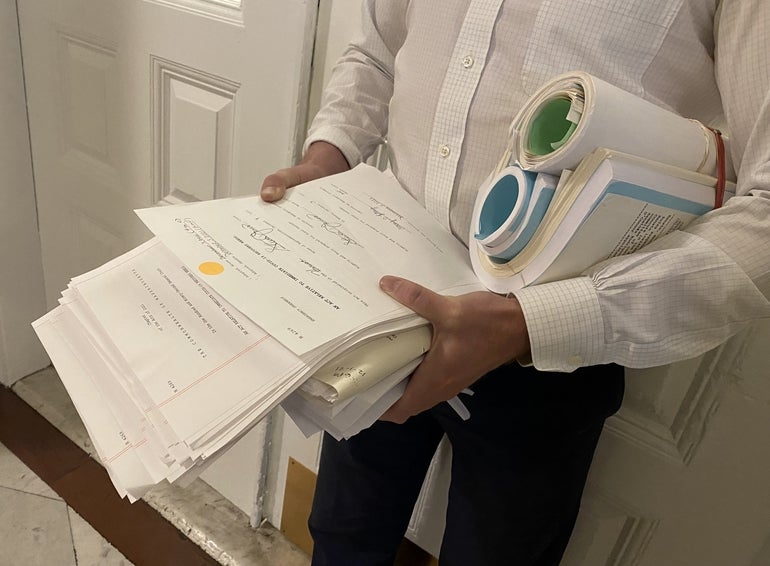Baker approves $4B COVID relief bill with minimized red tape
 Photo | State House News Service
An governor's aide holds the $4-billion pandemic relief bill, which includes allocations for healthcare, housing, education, and workforce issues.
Photo | State House News Service
An governor's aide holds the $4-billion pandemic relief bill, which includes allocations for healthcare, housing, education, and workforce issues.
Having taken his full 10 days to consider his options, Gov. Charlie Baker on Monday took his pen and scissors to the $4 billion federal aid and surplus disbursement bill, signing off on the spending decisions but cutting out some of the "red tape" he said would make it harder to quickly get money out to people who need it.
The governor signed the bill (H 4269) that deploys $2.55 billion in American Rescue Plan Act money and $1.45 billion in fiscal 2021 surplus state tax revenue, while preserving a little more than $2.3 billion in federal ARPA funds for future use.
But Baker also vetoed a policy section that required a large commission be consulted before premium pay could be awarded to frontline employees who worked during the COVID-19 state of emergency and returned another similar outside section with proposed amendments.
"This bill directs funding to key areas in need of support as Massachusetts continues its recovery from the pandemic. It invests substantially in health care, housing and homeownership, workforce development, and other key priorities. Our Administration is eager to begin quickly deploying these resources to the individuals and communities that desperately need them," Baker wrote in his filing letter, though he also noted the bill "falls far short of the investment I called for to address the housing shortage."
The spending itself is mostly concentrated on health care ($964 million), housing ($624 million), infrastructure ($414 million), education ($389 million) and economic development ($267 million), as well as on specific workforce issues ($500 million allotments for both premium pay awards and the state's unemployment insurance system), according to the Massachusetts Taxpayers Foundation's analysis.
Last week, Baker said that "red tape" was what his administration was most concerned about, pointing to a large commission created under the bill to make recommendations to the administration on how to divvy up bonuses of between $500 and $2,000 for essential, lower-income employees.
"We would rather just put a premium pay program together and get the dollars out the door to people," he said.
With his veto, that's exactly what Baker is hoping to be able to do. He wrote to lawmakers that he supports the premium pay program but said the way the Legislature had structured the commission and its responsibilities "is virtually guaranteed to significantly hinder disbursement of the funds."
"Various organizations are responsible for naming members of the panel, but it is unclear whom they are expected to inform of their appointment decisions. No one is empowered to call the first meeting of the panel, no chairs are named, and no deadlines apply to the panel. Despite this, [the Executive Office of Administration and Finance] must wait for the panel to coalesce and make recommendations, incorporate those recommendations into decisions about eligibility, and then design the means to identify and pay eligible recipients by March 31, 2022," Baker wrote. "Accordingly, we are vetoing those provisions of the bill."
The governor said his veto will allow his administration to "immediately begin the process of distributing these funds."
"We could send out $500 checks to almost 1 million Massachusetts residents as soon as possible," he wrote. Alluding to the possibility of a legislative override of his veto, Baker added, "Reinstituting the panel-driven process envisioned by the Legislature will simply disrupt the rollout midstream. We urge you to let our administration proceed with this important program today."
The section that Baker returned with amendments would establish a Behavioral Health Trust Fund that is set to receive $200 million under the bill. The governor said he supports the creation of the fund, but proposed amendments that would essentially give his administration, not the Legislature, the power to spend money from the fund.
Baker also vetoed line-item language in seven of the bill's spending items and, he said, "are limited to concerns I have with requirements imposed in specific line-items."
The governor's veto and amendments did not seem to rankle Senate President Karen Spilka, who said she is "particularly proud that the final bill will include $400 million for mental and behavioral health care, as so many people have struggled with the emotional impacts of the COVID-19 pandemic."
Spilka's office said she would review the governor's amendments and veto. If the Legislature is to override Baker, it will take two-thirds votes in both the House and Senate. And because the Legislature is in the midst of its seven-week winter break from formal sessions -- the kind at which roll call votes can take place -- any override vote would have to take place in the new year.
Mariano said he would be discussing the governor's actions with the Senate and said "it's important to note that he vetoed the March 31 deadline" for the premium payments to be issued.
"We have requested a timeline from the Administration on when they would be able to get the money out to essential workers so we can make an informed decision," Mariano, who met with Baker in the governor's office Monday afternoon just before the governor's action on the ARPA bill was announced, said.
Baker took his full allowance of 10 days to review the compromise ARPA and surplus spending bill that was negotiated by three representatives and three senators to come in almost $180 million higher than either of the House and Senate's original proposals. The Legislature took final votes Friday, Dec. 3 to get the $4 billion bill to Baker's desk after having failed to reach agreement on a final product ahead of the pre-Thanksgiving start of the legislative winter break.
Municipal officials around Massachusetts have been eagerly waiting for the state to finalize its ARPA plan to see if they might be able to piggyback off of state spending when they put their own ARPA allotments into action. About $7 billion has been made available to municipalities over the course of the pandemic to respond to and recover from COVID-19, including $3.4 billion in direct support from ARPA.
"We're anxiously awaiting plans for the state legislation so we can leverage our own funds locally, especially for major sewer and water," Auburn Town Manager Julie Jacobson told Lt. Gov. Karyn Polito and other administration officials at a November meeting of the Local Government Advisory Commission.
Economists at Fitch Ratings recently pointed to the infusion of federal cash and "economic growth above trend" as two key drivers that "will keep states and local government finances on a positive path in 2022," the agency said last week in its 2022 outlook for state and local governments.











0 Comments